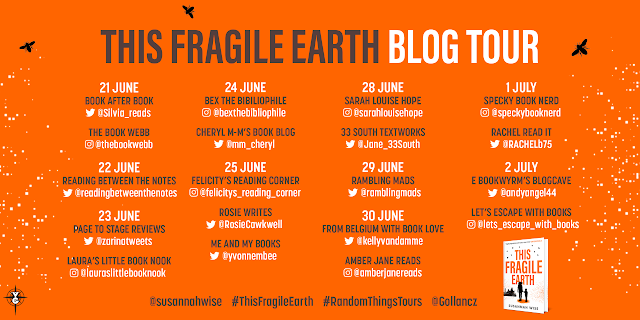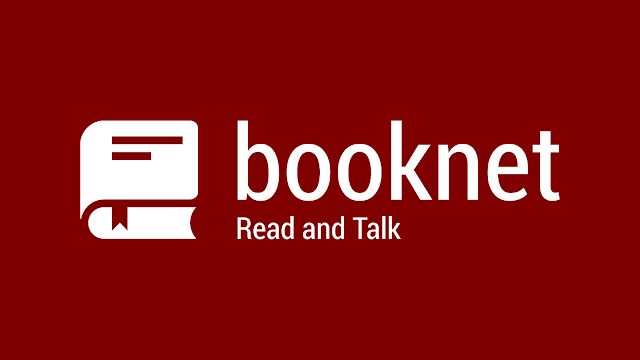Blog tour: This Fragile Earth
Welcome to the blog tour for This Fragile Earth by Susannah Wise, who kindly accepted to answer my questions about this book and beyond!
Hi Susannah! First of all, I would like to congratulate you on the publication of This Fragile Earth! Can you please briefly tell us what it is about?
A: Thank you so much! It’s a very exciting time and I’m thrilled to be here and answering these questions with you.
The novel is a deeply grounded science-fiction thriller with at its beating heart the very real love between a mother and son. In near-future London, utilities, water and all communications are suddenly cut off. Signy, a forty-something ex-composer and her six-year-old son Jed are worried, but Matthew her partner is less concerned. When something terrible happens, Signy and Jed flee the city and cycle 100 miles up the motorway to find her mother in a village in Northants. What they find there though, is not what they expect.
Did you have the plot entirely figured out when you started writing the book or did it take an unexpected turn as the characters grew on the page?
A: If I tell you I’ve answered your questions from the bottom up, does this help to explain my technique?!
Actually, with this first novel I did have the entire plot figured out. It came to me one night lying in bed, following the news that my father was dying of terminal cancer. I think the catastrophic fantasy element of the story was my way of managing my grief and pain, and I began writing the next day.
For my second book, I had not a clue where the plot was going, who the characters were going to be, nothing. I began with the seed of an idea: a woman who was seeing an analyst who is himself losing his memory. Everything went from there.
I do love the meditative nature of writing long-form prose. It allows so much scope and breathing space to move off into deltas before returning to the main thrust of the story.
What kind of research, if any, did you have to carry out for this novel? In general, is research something you enjoy or a mere means to an end?
A: With This Fragile Earth, I already had quite an interest in Artificial Intelligence and a very keen (truly amateur) interest in Quantum Mechanics. I read blogs and factual books (Superintelligence by Nick Bostrom was one) and attended an all-day Instant Expert series of lectures hosted by the New Scientist, in which specialists in the field of AI spoke to an audience about various aspects of the future.
A great deal of the theories within the book occurred to me whilst I was asleep and dreaming. The theory of Trinculation, which is a large part of the novel, came to me one night complete with title. It was most odd.
I do enjoy research, up to a point. I’m having a lot of fun at the moment meeting Matthew Child, a scientist who runs a lab on genetics and Toxoplasmosis at Imperial, for my third novel.
I suppose I tend to research as I go along, though I know some writers spend absolutely ages prepping before they even start. That’s not me - I’m not highbrow. It does make me wonder if I’d ever be able to write a historical novel.
If this novel was going to be turned into a film, who would you cast in the roles of Signy and Jed?
A: Hmm. Tricky. There are so many amazing people who could play Signy: I would have wanted Elliot Page but I think he'd possibly not consider such a role at the present time. Sienna Miller? Michaela Coel? Samantha Morton? Ruth Wilson? Indira Varma? Honestly, there are countless wonderful actors who could do it.
With Jed, it’s far harder to name anyone, as he’s only six! Do you remember Freddie Highmore in Finding Neverland? Perhaps someone like that.
Without giving too much away, can you tell us about a scene in the book that you love or that was particularly difficult to write?
A: I have always liked a scene near the beginning, in which Signy’s pregnant downstairs neighbour comes up to ‘borrow’ some water as hers has stopped, and then while she’s in their flat, Signy’s water goes off too and there is a very understated stand-off. I like it I think because of the psychology around it: the selfishness that arises in all of us when we’re peering over the edge of existence.
There is one scene in particular that my hand shook whilst writing. As you say, hard to describe here without giving too much away but it is, let’s say, the catalyst for Signy’s fleeing London with Jed her son. It occurs about halfway through the book and involves the two protagonists in an extreme state of terror.
Is there anything that didn’t make it into the final version of the book?
A: Oh my goodness, yes, loads. My original draft was around 90K words, but it went down to 76K and up to 110K at one point.
For instance, Signy and Jed spent far longer before they left London having interactions with people formerly, including the police at one point.
The ending too is actually quite different to the original draft. Several important industry people who really know their salt felt my first take was too bleak. I think it’s very important to be flexible as a writer: when you have spent so long on a project it can be hard to be objective. It is imperative that we listen to trusted fresh opinions.
If you are already working on your next writing project, would you mind giving us a little anticipation of what we are to expect?
A: Ha! Well…
I am currently working on two novels. The first will be my next book out and is probably in its fourth or fifth draft now. I completed the first draft on the Faber Academy course (in 2018), and I am now waiting for my editor’s latest notes and line-by-line. It’s a dark comedy about grief and contains elements of magical realism. It centres on a woman whose life is taking some rather other-worldly turns and who may, or may not, be having a breakdown.
The second novel will be my third book (I hope) and I am 77K words into the first draft. It’s set in a tiny village in Cumbria. The protagonist arrives as an outsider and the plot revolves around pigs and some very rum goings-on amongst the inhabitants. I was hoping to have had a draft completed by now but as it turns out, releasing a debut can be quite a busy time…
What are you reading at the moment?
A: I’m currently reading a proof copy of The Fair Botanists by Sara Sheridan. I was sent it by Hodder, and I’ve literally just started (about 30 pages in). So far, I’m really loving it. It’s set in 1822 in Edinburgh, and is about botany, friendship and hidden secrets.
I’ve just finished two books simultaneously: Burnt Sugar by Avni Doshi – brilliantly written and set in India, it’s full of honesty, sadness, strength, and white-hot rage.
The other one was Call to Kill by Mark ‘Billy’ Billingham, which is an SAS-centred political thriller. My friend Conor Woodman co-wrote it so I was keen to take a look. It’s not what I would usually pick up, but I very much enjoyed it. It moves along at a cracking pace and the multiple narrative works fantastically well.
Due to the popularity of social networking websites, interacting with readers – be it via Twitter, Facebook Instagram etc. – is becoming increasingly important. How do you cope with these new demands on authors and do you think that they somehow disrupt your writing schedule?
A: Good question! The answer is a bit of a mixed bag, for me. Social media is brilliant at bringing readers and writers together, as well as expanding an author’s reach. These are wonderful things. Any writer who ignores the power of bloggers, the opportunity to connect with early readers and the online community is unwise. It’s a great place too, for authors to meet their peers, share their experiences, and form bonds.
That being said, I do find having to promote and ‘brand’ myself across three – possibly four – platforms is tricky, time-consuming, and takes me away from the very important job of actually writing. I’m not massively tech-savvy, so uploading things and posting takes me aeons.
I also find that social media can tap into something a little darker, which I know many people will relate to - a latent private narcissism and need for approval. It can become quite addictive checking for likes or acknowledgments and is ultimately not what being an author is about. Around publication, I think it is to be expected that social media will take up a lot of a writer’s time, but other than that I try to limit my exposure.
What one piece of advice would you give to aspiring writers?
A: I would say to keep in mind that every writer has their own journey. Luck plays as big a part as anything – some people might not like to hear this because it takes away any sense of control, but it is, unfortunately, a fact. Hard work and talent are very important, but ulitmately any artist needs a large dollop of luck to land on their plate.
Most importantly, any career in the arts is a marathon and not a sprint. Keep going!
Thank you for your time!




Thanks for the blog tour support Silvia x
ReplyDelete